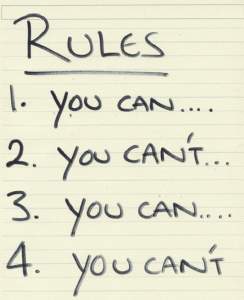 I am not an attorney. I don’t even play one on TV (though I did really want to go to law school so I could be a sports agent, but that’s neither here nor there).
I am not an attorney. I don’t even play one on TV (though I did really want to go to law school so I could be a sports agent, but that’s neither here nor there).
But I am a communications professional who spends a lot of time online and I can tell you, without a shadow of a doubt, you need a social media policy.
I spend a significant amount of time on the road, speaking to business owners, entrepreneurs, and leaders and what I’ve discovered is a very small minority have policies.
You have an employee handbook. Your employees know how to answer the phone, what to put in their email signature, even what to wear to trade shows. But you haven’t told them how to behave online.
The Legal Ramifications
Peter Fischer, an attorney at Stokes Roberts & Wagner, says it’s best to have a policy with a signature line on it where employees put their John Hancock.
In accordance with National Labor Relations Board laws, he recommends the following:
- Employers cannot restrict anyone from commenting on his or her work life.
- Employers can make sure employees sign confidentiality provisions.
- Employees can’t lie.
There aren’t clear cut laws (yet) on what can and can’t be said by employees – or how employers react – on the social networks.
That said, if a group of employees complains about a policy or procedure on their personal Facebook pages, the NLRB allows that. But, if a single employee posts something harmful to the company, the employer has more rights.
For instance, a few weeks ago, a young lady tweeted that she hated her job and her boss. The CEO of the company saw the tweet and tweeted her back, “That’s good because you no longer work here.”
The Social Media Policy
But don’t worry. It’s not as scary as it seems. Your social media policy doesn’t need to be drawn out and overly legal. It can be an addendum to your employee handbook.
It should include:
- Be transparent. State where you work and, if you’re distributing content for a client, make that clear.
- Don’t lie. Don’t misrepresent the organization, your customers, or your competitors.
- Be meaningful and respectful. Don’t spam or argue.
- Use common sense and common courtesy. If in doubt, don’t post.
- Stick to areas of expertise.
- Do offer insight and wisdom, but don’t provide any confidential information.
- Don’t swear.
- Be polite. Don’t be antagonistic.
- Do not comment on any legal matters or litigation.
- If the topic is one of crisis, do not comment.
- Google has a long memory. Be smart about what you post.
- Don’t post about competition unless you have written consent from them to do so.
- If you use social media on behalf of clients, please double check you’re updating from the correct account.
- Don’t be stupid.
Of course, these are just guidelines and you do want your attorney to review whatever it is you put together.
If you need help, there is a directory of social media policies already written and legally approved that you can use for your templates.
What else do you think should be included in a social media policy?
A version of this first appeared in my weekly Crain’s Chicago Business column.